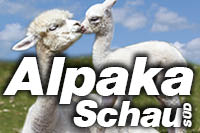Articles by Alpaca World Magazine:
The Italian Job 5
Hilary Shenton
And how it has rained! I have never seen anything like it. We have been awash since early March with violent thunderstorms, light drizzle and cold fog. Thankfully the days in between are pretty warm but nothing like this time last year. At the time of writing, now early June, I am honestly wondering where the summer is. The locals too are rather fed up.
The grass is growing like crazy ? at present it is one metre high. I am out with the strimmer every day just keeping it down on the paths leading to the alpaca paddocks. People are telling me to watch out for snakes ? I haven?t seen any yet but I think the wellies are going to be in use all year round. We are currently searching for someone to come and make the hay. So far the only people wanting to do it also want the hay. Not quite my plan.
In April I held my first introductory course for prospective alpaca owners at Maridiana in Umbria. This was a course based very much on our Alpaca Experience course from the UK. However I had to be prepared for the fact that it would probably be attended by Italian speakers. Hence I spent a lot of time with Gianni Berna from Maridiana Alpacas translating and memorising. I slept very little in the nights before worrying about whether I would cope.
In the event 8 people booked and one had reasonable English and two of the others knew a few words. All were very tolerant and helpful and the fact that I had made the effort was much appreciated. The presentation part of it went well and I had produced a Powerpoint presentation in Italian and provided hard copies which helped a lot. Even the questions were not too bad. The most difficult part was the ad hoc comments that were made when we were doing the practical part and when we went to lunch. Everyone was talking at once and frankly they could have been asking me anything from what was on the menu, what the weather was like and how was I liking Italy through to technical alpaca questions. However with the help of one or two and lots of pleas from me to ?please speak more slowly? we got through it. In fact I have had positive feedback from many who came.
This has prepared me well for doing a similar course down here in Basilicata but I think I need to do some more homework here because very few people speak English at all.
We are having a very busy time with the house and have had quite a lot of work done including a new kitchen and bathroom and new floors throughout. It is now time to start on the grounds. Yesterday there were eight men working here at one time with a huge digger and a lorry. They started to remove some concrete from the gardens only to find it was actually the foundations of the previous house. I have never seen so much rock and concrete in my life. However much they dug there was still more. They also succeeded in breaking through two water pipes.
They have also unearthed lots of buried rubbish and their answer when asked what to do with it was to re-bury it. Getting rid of refuse here is an expensive nightmare. Ordinary kitchen refuse is collected from huge bins in the villages so we have to take it to those bins. Anything else can be collected but there are no recognised dumps as in the UK and apparently there are some firms that charge you a lot of euros to collect it and then dump it on someone else?s ground.
The other issue we have had to contend with is a change in the planning laws. Our house is very close to a local beauty spot called Lago Sirino- a lake. We are third of the way up Mount Sirino at 750m and the whole area is very wooded so there is the equivalent of the UK forestry commission. In order to preserve the area they have in February pronounced new rules that means that anything at all you do to the outside of your house or the grounds has to have full planning permission. Hence we have now to wait for our swimming pool, our portico and porch and our log cabin and possibly it will even be next year. This is a real disappointment especially as it has happened since we moved here. However there is nothing we can do and the only reassurance we have had is that permission will be granted it is just a question of when.
The alpacas remain just fine. We have had only one big upset in that our black suri stud male has suddenly died. The autopsy revealed hypomagnesia which is the result of having too much wet lush spring grass ie grass staggers. We could do nothing. He just keeled over and died one night.
I had thought we regulated their grass intake well but clearly not well enough. They are now all on a different regime. They are penned up from 8pm to 12 midday with just hay to eat and then let out in the field from 12 midday to 8pm. In addition they have alfalfa pellets in the mornings.
All are now registered with Italpaca, the Italian Alpaca Breeders Association. The registration process is similar to the BAS process except that we have to provide two photographs of each alpaca, a left and right profile, and any male to be used for breeding has to have a DNA test. In addition to this all are registered on the European part of the British registry.
In terms of local bureaucracy apparently the health department takes blood samples of all incoming animals of any species to check for infectious diseases. However this seems to be quite random in practice and we have not yet been contacted even though we are registered with the local office. Apparently we do not have to pay for any part of this service. What I have not yet found out is what diseases they are looking for and what they do with the results and the outcome. Doubtless all will be revealed by the time of my next Italian Job.
Tweet



